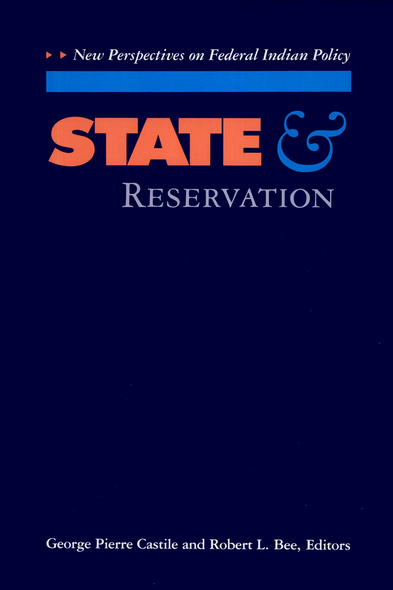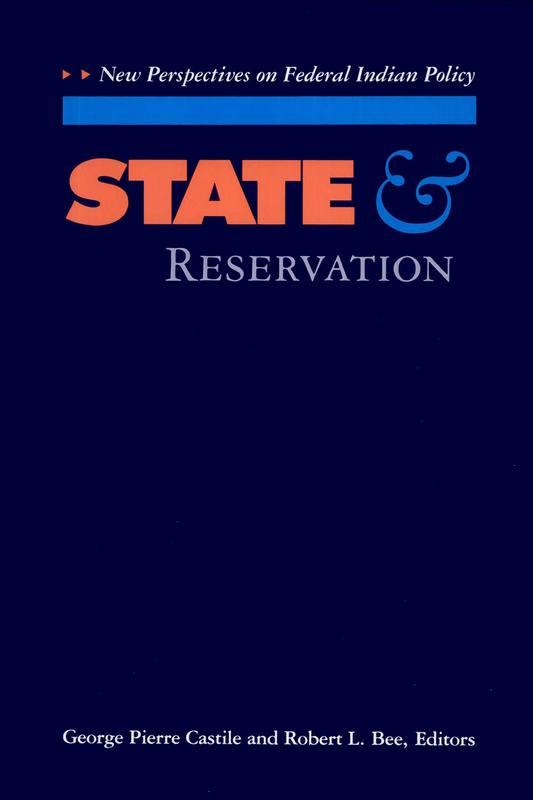State and Reservation
New Perspectives on Federal Indian Policy
Edited by George Pierre Castile and Robert L. Bee
The University of Arizona Press
Ten original essays focus on the rise, change, and persistence of the Native American reservation system. Contributors drawn from history, anthropology, sociology, and political science offer divergent points of view buttressed by historical and ethnographic case studies. Together, these articles suggest that the time has come—or is long overdue—to rethink the basic assumptions underlying Federal Indian policy.
CONTENTS
Introduction, George Pierre Castile & Robert L. Bee
Part I—Historical Foundations of the Reservation System
An Elusive Institution: The Meanings of Indian Reservations in Gold Rush California, John M. Findlay
Crow Leadership Amidst Reservation Oppression, Frederick E. Hoxie
Part II—The Nonreservation Experience
Utah Indians and the Homestead Laws, Martha C. Knack
The Enduring Reservations of Oklahoma, John H. Moore
Without Reservation: Federal Indian Policy and the Landless Tribes of Washington, Frank W. Porter, III
Part III—Power and Symbols
Riding the Paper Tiger, Robert L. Bee
Indian Sign: Hegemony and Symbolism in Federal Indian Policy, George P. Castile
Part IV—The Resource Base
Primitive Accumulation, Reservations, and the Alaska Native Claims Settlement Act, Lawrence Weiss & David C.Maas
Shortcomings of the Indian Self-Determination Policy, George S. Esber, Jr.
Getting to Yes in the New West: The Negotiation of Policy, Thomas R. McGuire
CONTENTS
Introduction, George Pierre Castile & Robert L. Bee
Part I—Historical Foundations of the Reservation System
An Elusive Institution: The Meanings of Indian Reservations in Gold Rush California, John M. Findlay
Crow Leadership Amidst Reservation Oppression, Frederick E. Hoxie
Part II—The Nonreservation Experience
Utah Indians and the Homestead Laws, Martha C. Knack
The Enduring Reservations of Oklahoma, John H. Moore
Without Reservation: Federal Indian Policy and the Landless Tribes of Washington, Frank W. Porter, III
Part III—Power and Symbols
Riding the Paper Tiger, Robert L. Bee
Indian Sign: Hegemony and Symbolism in Federal Indian Policy, George P. Castile
Part IV—The Resource Base
Primitive Accumulation, Reservations, and the Alaska Native Claims Settlement Act, Lawrence Weiss & David C.Maas
Shortcomings of the Indian Self-Determination Policy, George S. Esber, Jr.
Getting to Yes in the New West: The Negotiation of Policy, Thomas R. McGuire
A balanced view of the variety of problems associated with the identity and character of Indian reservations and other forms of Indian settlement.' —Western Historical Quarterly
'An impressive source of material for several states, federal Indian policies, and tribes that heretofore have received scant scholastic attention.' —Growth and Change
'While many historians have avoided topical theoretical models of social scientists and cultural critics, the articles contained in this volume make convincing arguments to extend the normal boundaries of scholarship across disciplinary lines. . . . The authors have produced a highly readable yet scholarly volume.' —Chronicles of Oklahoma
George Pierre Castile is a professor of anthropology at Whitman College.





